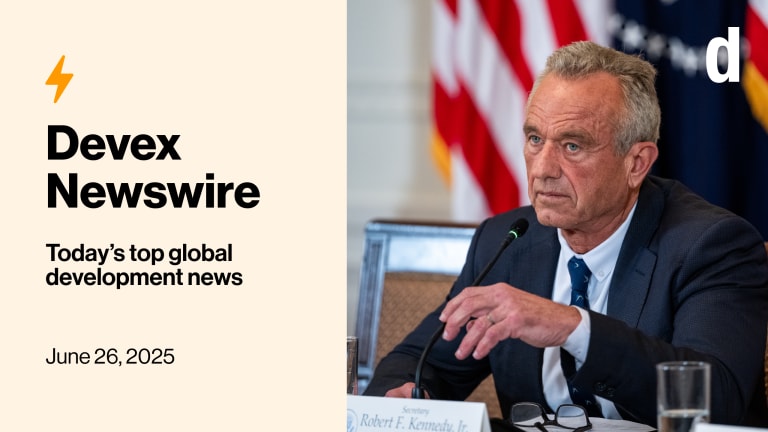
Open Philanthropy, the influential research and grant-making foundation, recently updated its internal framework for choosing the most cost-effective causes to support. It’s now giving more weight to life expectancy gains, relative to income.
My colleague Stephanie Beasley reports that Open Philanthropy recently updated its global health and well-being “cause prioritization framework,” which lays out — in highly technical detail — how the organization compares different kinds of grant-making opportunities to determine which of them is most cost-effective. Open Philanthropy, recall, is part of the “effective altruism” movement, which generally holds that donors have a huge opportunity and responsibility to select charitable causes that will do as much good as possible.
This is a preview of Newswire
Sign up to this newsletter for an inside look at the biggest stories in global development, in your inbox daily.
At a Center for Global Development event this week, Open Philanthropy co-CEO Alexander Berger and research fellow Peter Favaloro pulled back the curtain a bit on how the organization makes those decisions. Giving more weight to life expectancy increases, for example, was partially based on findings from a recent survey in Ghana and Kenya — commissioned by GiveWell and conducted by IDinsight — that suggested communities preferred life-saving interventions over income gains.
“Instead of just sort of off-the-cuff deciding what issue areas we’re going to work in and then trying to find the best grants within that, we’re actually trying to think from the ground up, which issue areas can we have the most impact in our grant-making,” Favaloro said.
Devex Pro: 3 ways evidence-minded donors can prioritize their giving
Leap of faith
“It’s almost impossible to go and talk about such a sensitive topic without actually having some kind of engagement with some influencers.”
— Tanya Mahajan, director of international programs, The Pad ProjectStigma around menstruation makes it even more difficult for people who menstruate to access WASH facilities, information, and sanitary products, and can contribute to discrimination and exclusion of people who menstruate. In many places, that stigma is linked to religious practices — and when it’s done correctly, engaging faith leaders can open opportunities to change the conversation, Rebecca Root reports.
Read: The role of faith in destigmatizing menstrual health
Pounds of prevention
My colleague Will Worley continues to chase down the tangible impacts of the U.K. government’s deep cuts to its foreign aid budget. This time, he reports on expert testimony that the aid cuts have hindered programs aimed at preventing violent atrocities from occurring. Those warnings come as the government’s development watchdog committee conducts an inquiry into whether the United Kingdom ought to have an atrocity prevention strategy.
Read: UK aid cuts increase the risk of atrocities, says IRC
+ Track Britain’s controversial aid cuts, and Pro subscribers can learn about what U.K. aid can look forward to in 2022.
Healthy debate
The struggle over COVID-19 vaccination mandates is playing out in a handful of African countries, some of which have imposed mandatory vaccination on civil servants, Madalitso Kateta reports for Devex.
In Malawi, the Centre for Democracy and Economic Development Initiatives recently took the government to court, arguing that mandatory jabs were not justified because of the country’s low fatality rate. Sylvester Namiwa, the group’s executive director, wrote that the government should “desist from merely copying what other countries are doing” by “implementing lockdowns and mandatory policies without any basis.” A judge dismissed the charges yesterday, though lawyers indicated that they could take the case to the country’s supreme court.
“My advice to the population of the continent is 'go and get vaccinated' so that it becomes unnecessary ... for governments to impose mandatory vaccines,” says Dr. John Nkengasong, head of the Africa Centres for Disease Control and Prevention.
Read: Are COVID-19 vaccine mandates the next step for African countries?
Meanwhile, Africa’s fourth COVID-19 wave — fueled by the omicron variant — appears to be flattening after six weeks, which would mark the shortest wave yet, Sara Jerving reports. A World Health Organization official described the latest wave as “steep and brief but no less destabilizing,” and health experts are urging people to continue following public health guidance to help manage those impacts.
Read: African continent experiences shortest COVID-19 wave
+ For more content like this, sign up for Devex CheckUp, the must-read weekly newsletter for exclusive global health news and insider insights.
In other news
More than 100 million donated doses of COVID-19 vaccines were rejected in December due to their short shelf lives and the lack of storage facilities in countries receiving them, according to UNICEF. [Reuters]
On Friday, WHO approved two more treatments for severe and critical COVID-19 patients: synthetic antibody treatment sotrovimab and arthritis drug baricitinib. [AFP in Times of India]
The Taliban have proposed a joint body that would bring together its own representatives with officials from international organizations to coordinate the delivery of badly needed aid to the country. [Reuters]
If you’ve been feeling like carbon offset markets aren’t already confusing enough, good news: They are now increasingly tied to cryptocurrency. [Wall Street Journal]
Sign up to Newswire for an inside look at the biggest stories in global development.




